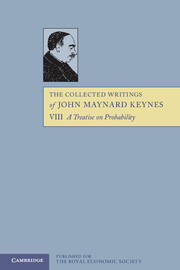Book contents
- Frontmatter
- Contents
- General Introduction
- Editorial Foreword by R. B. Braithwaite
- Editorial Note
- Preface to the First Edition
- I FUNDAMENTAL IDEAS
- 1 THE MEANING OF PROBABILITY
- 2 PROBABILITY IN RELATION TO THE THEORY OF KNOWLEDGE
- 3 THE MEASUREMENT OF PROBABILITIES
- 4 THE PRINCIPLE OF INDIFFERENCE
- 5 OTHER METHODS OF DETERMINING PROBABILITIES
- 6 THE WEIGHT OF ARGUMENTS
- 7 HISTORICAL RETROSPECT
- 8 THE FREQUENCY THEORY OF PROBABILITY
- 9 THE CONSTRUCTIVE THEORY OF PART I SUMMARISED
- II FUNDAMENTAL THEOREMS
- III INDUCTION AND ANALOGY
- IV SOME PHILOSOPHICAL APPLICATIONS OF PROBABILITY
- V THE FOUNDATIONS OF STATISTICAL INFERENCE
- Bibliography
- Index
4 - THE PRINCIPLE OF INDIFFERENCE
from I - FUNDAMENTAL IDEAS
Published online by Cambridge University Press: 05 November 2012
- Frontmatter
- Contents
- General Introduction
- Editorial Foreword by R. B. Braithwaite
- Editorial Note
- Preface to the First Edition
- I FUNDAMENTAL IDEAS
- 1 THE MEANING OF PROBABILITY
- 2 PROBABILITY IN RELATION TO THE THEORY OF KNOWLEDGE
- 3 THE MEASUREMENT OF PROBABILITIES
- 4 THE PRINCIPLE OF INDIFFERENCE
- 5 OTHER METHODS OF DETERMINING PROBABILITIES
- 6 THE WEIGHT OF ARGUMENTS
- 7 HISTORICAL RETROSPECT
- 8 THE FREQUENCY THEORY OF PROBABILITY
- 9 THE CONSTRUCTIVE THEORY OF PART I SUMMARISED
- II FUNDAMENTAL THEOREMS
- III INDUCTION AND ANALOGY
- IV SOME PHILOSOPHICAL APPLICATIONS OF PROBABILITY
- V THE FOUNDATIONS OF STATISTICAL INFERENCE
- Bibliography
- Index
Summary
Absolute. ‘Sure, Sir, this is not very reasonable, to summon my affection for a lady I know nothing of.’
Sir Anthony. ‘I am sure, Sir, ‘tis more unreasonable in you to object to a lady you know nothing of.’
1. In the last chapter it was assumed that in some cases the probabilities of two arguments may be equal. It was also argued that there are other cases in which one probability is, in some sense, greater than another. But so far there has been nothing to show how we are to know when two probabilities are equal or unequal. The recognition of equality, when it exists, will be dealt with in this chapter, and the recognition of inequality in the next. An historical account of the various theories about this problem, which have been held from time to time, will be given in chapter 7.
2. The determination of equality between probabilities has received hitherto much more attention than the determination of inequality. This has been due to the stress which has been laid on the mathematical side of the subject. In order that numerical measurement may be possible, we must be given a number of equally probable alternatives. The discovery of a rule, by which equiprobability could be established, was, therefore, essential. A rule, adequate to the purpose, introduced by James Bernoulli, who was the real founder of mathematical probability, has been widely adopted, generally under the title of the principle of non-sufficient reason, down to the present time.
- Type
- Chapter
- Information
- The Collected Writings of John Maynard Keynes , pp. 44 - 69Publisher: Royal Economic SocietyPrint publication year: 1978



